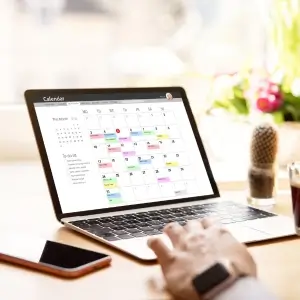Zena Everett is an international speaker on leadership and productivity (crazy busyness). She is the award-winning author of two books: Mind Flip: Take the Fear out of Your Career and The Crazy Busy Cure, a productivity book for ‘people with no time for productivity books’. www.zenaeverett.com.
We asked Zena one question.
Zena, you say that organisations search for the best talent but then block them from performing at their best. What do you mean?
We are all bogged down with ‘productivity drag’ – the chronic friction that gets in the way of getting things done, like inefficient meetings, low-value tasks that bulk up workloads, lengthy decision-making, and endless digital interruptions.Over 330 billion emails are sent every single day. If you’ve ever tried to do some deep thinking in ten-minute slices in between meetings, you’ll know what I mean: it’s impossible and it does your head in. No wonder we are all wired and tired. We are constantly toggling backwards and forwards in between distractions. We have to get a grip on our time.
Research shows we waste as much as 25% of our time on productivity drag: at least a lost day per week. We’d never waste any other resource in the way we waste time. And the old cliché is that time is the only resource we can’t make more of. Once it’s gone, it’s gone. Removing organisational drag is the vital bridge between strategy and execution, to get things done. People who do this are more successful and end up working fewer hours. They are much better managers too.
Here’s how to regain energy and attention and get the most important things done.
Be crystal clear on the expectations you have to meet - It sounds obvious but the first step in ensuring you are productivity busy, not crazy busy, is to clarify your job description. Whether it's your first day in a new job or you're embarking on your fifth year, it's essential to know your job! What are you measured on, what’s the difference between high performance and just doing the job? How will you stand out against your peer group in a selection process? Does how you spend your time every day reflect this? What do you need to spend more time on? This is important if you are starting a new role. I find that more senior people who have been in roles for a while can be a bit vague on what their boss wants most. Perhaps their job descriptions are way out of date, or they have accumulated other responsibilities over time, or they are in some kind of complex matrix system reporting to more than one person. You can’t focus on your priorities if you don’t know what they are. Get them aligned. Figure out who the most important stakeholder is and focus your time on meeting their expectations.

Do fewer tasks -Yes really. When I ask people how much time they spend on activities that would have the greatest impact their answer is often less than 5%. Prioritisation isn’t just about saying yes to one big thing that moves the needle, it’s about saying no to everything that gets in its way. Ask for extensions on deadlines so you can schedule tasks realistically and give yourself space to execute them well. You can only do one thing at once. Get in on planning conversations earlier to pre-empt problems before they escalate, rather than spending extra time fixing them down the line.
Accelerate productivity with blocks of 100% attention - Stop trying to squeeze your real work around the sides of meetings and calls. Ringfence‘flow’ timein your calendar to do deep work, ideally in 90-minute chunks. Continually switching tasks to deal with interruptions slows you down. You still think about the uncompleted task and this attentional residue means lower task performance. Get hooked on the high of work: the intense satisfaction of deep concentration.
Put rigour into your meetings -The craziest time suck is attending an unnecessary meeting to talk about work instead of doing it. The average professional spends 23 hours a week in meetings, fragmenting their time so all they can do in between meetings is a spurt of emailing. Cut meetings to 45 minutes and clarify the payoff in advance. Insist on meeting agendas: don’t attend if there isn’t one. Meetings should be saved for decisions, flagging up issues, brainstorming or celebrating, never sharing information. It’s crazy to get everyone to stop working at the same time and listen to information that could be shared in a different way, to listen. Send that out to be listened to or viewed to suit individuals’ schedules so people don’t have to all down tools at once. Limit numbers in meetings and committees to speed up decision-making. You don’t want too many people in the tent.
If you are a manager, don’t use technology as a surveillance tool. Measure what’s getting done, not who is online.

Work asynchronously - Communication tools like Zoom, Slack and Microsoft Teams may help us feel connected, but our days have become a mess of half-conversations on multiple channels. Constant connectivity means we ping-pong from one conversation or task to another, wasting time as we refocus. Establish quiet times and disconnect so you can focus. Switch off notifications and agree on how and why you should be contacted when you are offline. If you are a manager, don’t use technology as a surveillance tool. Measure what’s getting done, not who is online.
Have lunch together - My top hybrid working tip. I see too many teams who come into the office and then spend the whole day at their screens. Talk to each other. Spending even half an hour having lunch together means you are rebuilding those important networks. It allows you to nip problems in the bud. It’s so much easier to give feedback when you have a more personal relationship and establish some trust. Get to know each other again.
Thank you Zena for sharing your important insights into how we can all be less crazy busy.
If you are a jobseeker or a professional feeling crazy busy and looking for a change, reach out to one of our Consultant sor view our available jobs.


